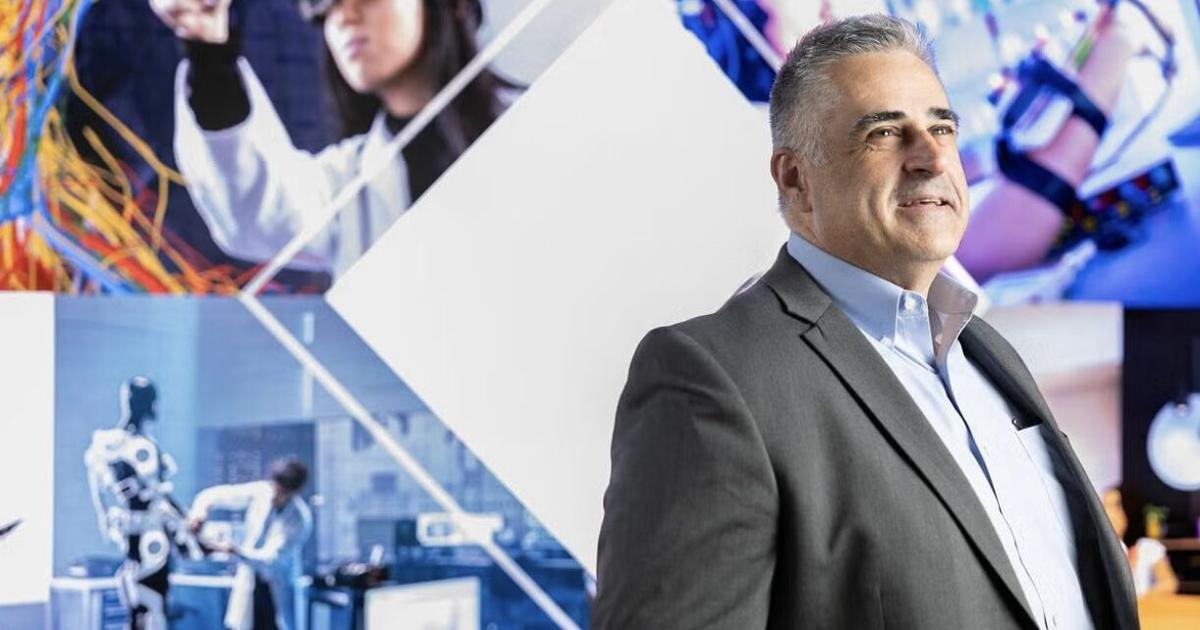Dr. Roger Azevedo, Pegasus Professor in the UCF School of Modeling Simulation and Training, introduces the possibility of human digital twinning in healthcare with his research.
Courtesy of Chad Binette (via UCF Today)
A Pegasus Professor at the UCF School of Modeling, Simulation and Training is researching the development of human digital twins that could potentially serve a wide variety of uses, from helping students in algebra to aiding in medical diagnoses.
Currently, Dr. Roger Azevedo sees two visions for where his research can go regarding his focus on human digital twins: replicating healthcare professionals and replicating patients’ future selves.
“Imagine you were in the College of Nursing, we’re trying to basically replicate an expert nurse practitioner, so that that human, digital twin of an expert nurse practitioner, can really live anywhere,” Azevedo said.
Azevedo asks to picture being in a clinic, but instead of having normal walls, there will be nano materials that can hear, feel and think.
“Imagine you’re the patient, I’m a novice nurse practitioner, right in my clinical setting,” Azevedo said. “You’re coming in to see me, we’re having a patient, doctor, clinician interaction. This thing, because it’s an expert, hears that I may be going down the wrong diagnostic path and potentially misdiagnosing you. So imagine it interviewing and providing real-time coaching.”
The other vision for his human digital twin research is giving patients the possibility to talk to their future selves. The digital twin would have access to a patient’s medical data, and if asked prompts such as “show me what’s going to happen to me if I don’t make any changes to my food or lifestyle,” the digital twin could show what a patient’s health could be within a few years.
“All of a sudden, because you didn’t make any changes, you’re meeting your future self, and now you do have diabetes, and then at six, five or 10 years from now, all of a sudden, now you’re blind in one eye, or now you have to have a limb amputated,” Azevedo said. “So for people, the uses of the human digital twin are endless.”
The digital twin would not only be for patients and trained clinicians, but for students as well.
“So imagine you have a simulation environment where you have a simulated student who is an embodiment of who you are, and you have an algebra problem, then you’re teaching it the algebra knowledge, skills and the self-regulatory skills,” Azevedo said. “Then this thing, basically, after you finish teaching, it actually shows you and simulates how you would solve the problem.”
With the future of healthcare changing, future healthcare workers have thoughts on what it means for digital twinning or other AI inventions joining them in the medical room.
Madelyn Kirby, a first-year nursing student at Keiser University, is planning on entering the medical field, knowing the possibility of AI joining her along the way.
“Coming from a future nurse’s point of view, I would say that sounds extremely intriguing,” Kirby said.
However, Kirby isn’t without her skepticism, questioning whether AI can have an honest role within healthcare without being incorrect or violating the Health Insurance Portability and Accountability Act.
“I would definitely have a lot of questions to ask about it, like how would it know everything about the patient?” Kirby said. “It sounds extremely complex, but something like this working would definitely be huge for future healthcare.”
There’s also the question of whether patients will trust AI in healthcare, putting confidence in a diagnosis that isn’t done by a human.
Reese Freireich, a senior public relations and advertising major, has her own thoughts on letting AI in healthcare from a patient’s point of view.
“I think this could be a good and more efficient way to test medications without the sacrifice of one’s individual health,” Freireich said. “However, I would be somewhat hesitant to test the abilities of AI to be completely accurate. The internet and AI are never completely correct, and there is always risk of information being misleading or inaccurate.”
Before his time researching the possibility of human digital twins at UCF, Azevedo first had to embark on a rigorous journey to get there — grew up in the midst of a civil war in his home country of Angola. Mundane worries, such as education, were not the first to come to mind, but survival was.
Azevedo and his family immigrated to Montreal, Canada, a country that made him feel out of place as a non-English or non-French speaker. His parents worked hard as blue-collar workers, his mother working in a sweatshop and his father at an airport.
“Persistence is the big thing, I think too many people give up when the tough gets going,” Azevedo said. “You just have to persist. I’ve found and also learned, mostly from my successes, that they are wonderful, but I think the best lessons are learned from our failures.”
He went off to do his undergraduate studies in psychology, where he worked in a research lab that focused on rats and psychopharmacology for three years. Azevedo then studied at McGill University for cognitive science to understand the inner workings of the human mind.
“The thought of even going to McGill, an Ivy League school for a PhD, was like a non-possibility,” Azevedo said.
After his time at McGill University, Azevedo came to the United States, where he eventually was hired by UCF in 2018 to be the lead scientist for the Learning Sciences Faculty Cluster Initiative.
“What I love about being here is I feel like the kid in the candy store who’s got too much sugar, and we work with all these folks because at the core of what we do, as a psychologist, is we study humans, humans and machines, some kind of machine interaction,” Azevedo said.

